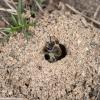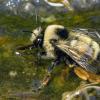Even with physical distancing and shelter-in-place requirements, there are still a lot of actions many of us can take to help in the fight against climate change.
A few months ago, when I volunteered to write a blog post about climate change for Earth Week, I didn’t realize how difficult it would be. It’s hard to ask people to think about a global crisis like climate change in the midst of another global crisis: The coronavirus. There is naturally a lot of stress and anxiety right now—as we worry about our health and that of our friends and families, and navigate challenges, including impacts that are amplified by social inequities. My heart goes out to all who have been affected, especially those who are experiencing, or have lost loved ones to, COVID-19.
I still think it is worth taking some time to talk about climate change, because climate change is not going to go away without our help. One thing that does give me hope is seeing the global response to the coronavirus. Many cities, states, and nations have demonstrated that governments are capable of acting boldly when the scale of the crisis is understood. Earth Week is a great time to remind our communities and our elected leaders of how much we have to gain by addressing the climate crisis head-on. By acting now, we can stave off the worst effects of climate change, including the many negative effects on human health, such as illness related to heatwaves, air pollution, and increased risk of some infectious and vector-borne diseases. (Note: There is not yet sufficient research to determine if or how the coronavirus is affected by climate change.)
Another hurdle to addressing climate change at this time is that many people might be feeling unsure of how to proceed. Some good news (amidst all the bad) is that even with physical distancing and shelter-in-place requirements, there are still a lot of actions many of us can take to help in the fight against climate change. Focusing on one or any combination of these actions can help.

Creating and protecting habitat is an important step in helping pollinators and other insects to be more climate resilient. (Photo: Xerces Society / Eric Lee-Mäder)
Two Things You Can Do to Help Pollinators Be More Resilient to Climate Change
- Plant a pollinator garden. Pollinator gardens can provide meaningful habitat for pollinators, and these gardens can contribute to pollinator conservation, helping them to be resilient to climate change. Learn more here.
- Avoid using pesticides around your home for cosmetic (appearance-based) reasons. The effects of pesticides and climate change can combine to magnify negative effects on pollinators.

According to the Fourth National Climate Assessment, the transportation sector is the largest emitter of greenhouse gases in the US. We can each take action to reduce our carbon emissions from transportation by carpooling, biking, or using public transportation whenever possible. Choosing electric vehicles or fuel efficient vehicles will also help. Encourage places of business or your local governments to transition to electric or hybrid vehicles. (Photo: Xerces Society / Anne Stine)
Ten Things You Can Do This Week (and Always) to Address the Climate Crisis
- Support politicians who will actively address the climate crisis. You can do this by voting and volunteering in physically distant ways, such as phone or text banking.
- Keep pressure on your representatives to act. Contact your representatives at all levels of government and let them know that we demand action on climate change—and that those actions must match the scale of the problem we are facing.
- Join a local climate action group. Such groups can help push through policies that will mitigate the climate crisis and raise public awareness. Here is one place to get started.
- Join the divestment movement. When possible, talk to employers, universities, or other major entities about divesting from fossil fuels. Click here to get started.
- Reduce food waste. Many of us are conscious of this due to financial stress, but it also supports the climate.
- Shift to a less meat-centric diet, if it is an economically viable option for you. When possible, support producers that manage livestock and their land in sustainable ways.
- Support local investments in public transportation and safe streets for walking and biking. If you can afford it, consider an electric vehicle for your next car purchase.
- Join the Earth Day Live virtual climate strike, April 22–24. Click here to join.
- Plant a native tree. In addition to aiding carbon sequestration, planting trees will reduce temperatures in urban areas, which are often higher than surrounding landscape due to the urban heat island effect. Trees will also provide food for some of the many moth and butterfly species that rely on specific native trees. The birds in your neighborhood will also thank you for it. Read more about this in one of my previous blog posts.
- Defend science. It’s more important than ever that we support scientific efforts to track, study, and understand the climate crisis and to make decisions guided by that science.
A special thank-you to Emily Krafft, Xerces Society Grants Coordinator, for her help on this blog!
%20Tim%20Dunne%20(4).jpg)
Planting a native tree will help your neighborhood stay cooler while providing important resources for wildlife, including may Lepidopterans (butterflies and moths). (Photo: Tim Dunne)
Further Reading
Read more about climate change on the Xerces blog.
Check out the rest of our Earth Week content!




